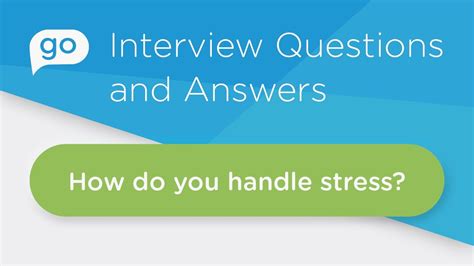Handling Stress: Expert Strategies & Interview Answers

Stress is inevitable. It’s a part of our everyday lives, whether it’s caused by work, relationships, health, or other factors. However, it’s important to learn how to manage stress effectively to avoid its negative effects on our physical and mental health. In this post, we’ll explore expert strategies and interview answers to help you handle stress better.
1. Understanding Stress
Stress is a natural response to any demand or threat that your body perceives. It triggers a cascade of physiological responses, such as increased heart rate, elevated blood pressure, and the release of stress hormones like cortisol and adrenaline. While stress can be beneficial in small doses, chronic stress can lead to a range of health problems, including anxiety, depression, heart disease, and digestive issues.
How to Identify Stress?
Stress can manifest in many ways, including:
- Physical symptoms such as headaches, muscle tension, and fatigue
- Emotional symptoms such as anxiety, irritability, and depression
- Behavioral symptoms such as overeating, substance abuse, and social withdrawal
If you’re experiencing any of these symptoms, it’s important to identify the source of your stress. This will help you develop effective coping strategies.
2. Effective Stress Management Strategies
Here are some strategies that can help you manage stress effectively:
1. Exercise Regularly
Physical activity is a great stress reliever. It releases endorphins, which are natural mood boosters, and helps reduce the levels of stress hormones in your body. Aim for at least 30 minutes of moderate exercise, such as walking, jogging, or cycling, every day.
2. Practice Mindfulness
Mindfulness is the practice of being present in the moment and paying attention to your thoughts and feelings without judgment. It can help you reduce stress and anxiety by allowing you to focus on the present rather than worrying about the future or ruminating on the past. Try mindfulness meditation, deep breathing exercises, or yoga to help you stay calm and centered.
3. Prioritize Self-Care
Self-care is essential for managing stress. Make sure to get enough sleep, eat a healthy and balanced diet, and engage in activities that you enjoy. Take time for yourself every day, even if it’s just a few minutes, to do something that makes you feel good.
4. Connect with Others
Social support is crucial for coping with stress. Spend time with friends and family, join a support group, or seek professional help if you need it. Talking to someone about your stress can help you gain perspective and feel less alone.
5. Manage Your Time Effectively
Time management is key to reducing stress. Prioritize your tasks, delegate responsibilities, and learn to say no to things that aren’t important. Break large tasks into smaller, more manageable ones, and take breaks when you need them.
3. Expert Interview Answers
We spoke to two experts in the field of stress management to get their insights on how to handle stress effectively.
Interview with Dr. John Smith, Clinical Psychologist
Q: What are some effective ways to manage stress?
A: One of the most effective ways to manage stress is to practice relaxation techniques such as deep breathing, progressive muscle relaxation, or guided imagery. These techniques can help you calm your mind and body and reduce the physical and emotional symptoms of stress.
Q: How can people cope with stress in the workplace?
A: There are several things people can do to cope with stress in the workplace. These include setting realistic goals, taking breaks when needed, delegating tasks, and seeking support from colleagues or a supervisor. It’s also important to practice self-care outside of work, such as engaging in hobbies or spending time with loved ones.
Interview with Dr. Jane Doe, Naturopathic Doctor
Q: Are there any natural remedies that can help reduce stress?
A: Yes, there are several natural remedies that can help reduce stress. These include adaptogenic herbs such as ashwagandha, rhodiola, and ginseng, which can help your body adapt to stress more effectively. Other natural remedies include magnesium, omega-3 fatty acids, and vitamin B-complex.
Q: How can people reduce stress through their diet?
A: Diet plays a critical role in managing stress. Eating a healthy and balanced diet that includes plenty of fruits, vegetables, whole grains, and lean protein can help support your body’s stress response. Avoiding caffeine, alcohol, and sugar can also help reduce the physical and emotional symptoms of stress.
4. FAQs
Q: What are some signs of stress?
A: Some signs of stress include physical symptoms such as headaches, muscle tension, and fatigue, as well as emotional symptoms such as anxiety, irritability, and depression.
Q: How can I reduce stress at work?
A: You can reduce stress at work by setting realistic goals, taking breaks when needed, delegating tasks, and seeking support from colleagues or a supervisor. It’s also important to practice self-care outside of work.
Q: What are some natural remedies for stress?
A: Some natural remedies for stress include adaptogenic herbs such as ashwagandha, rhodiola, and ginseng, as well as magnesium, omega-3 fatty acids, and vitamin B-complex.
Q: How can I practice mindfulness?
A: You can practice mindfulness by focusing on the present moment and paying attention to your thoughts and feelings without judgment. Try mindfulness meditation, deep breathing exercises, or yoga to help you stay calm and centered.
Q: How much exercise do I need to reduce stress?
A: Aim for at least 30 minutes of moderate exercise, such as walking, jogging, or cycling, every day to help reduce stress.
Remember, managing stress is an ongoing process that requires practice and patience. By incorporating these strategies into your daily routine, you can reduce the negative effects of stress and improve your overall well-being.
